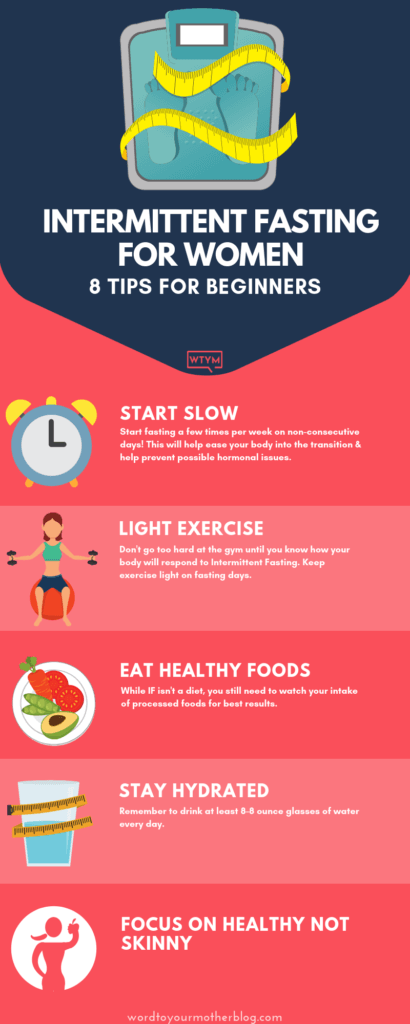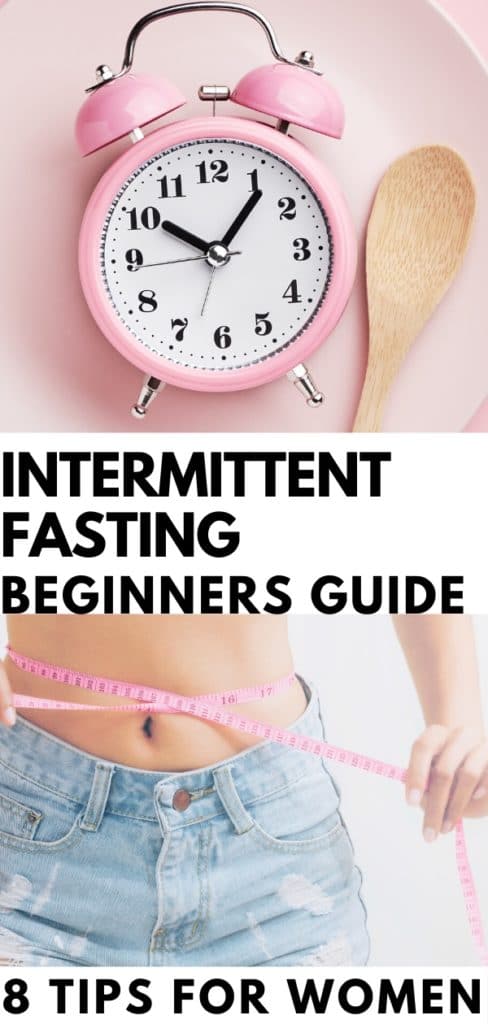Typically, anything that markets itself “to” or “for” women makes me suspicious, but when it comes to Intermittent Fasting, things are legitimately different for the ladies. Today I’ll break down the 411 on Intermittent Fasting for women, including the benefits, risks, schedules, and oh, yeah – eight tips that will help you get started.
Unless you’ve been hiding under a rock, you’ve heard about the benefits of Intermittent Fasting: how IF helps insulin sensitivity, increases energy, helps you burn fat and helps you lose weight.
But before you go any further, let’s take a look at Intermittent Fasting for women up close and personal style – and unlock the details you need before committing.

I can tell you from personal experience that Intermittent Fasting works. Now, it wasn’t easy to adapt to in the beginning. At my heaviest, I weighed over 250 pounds. To say the least, I was not pleased with how I looked or felt, and I was desperate to find a strategy that increases metabolic rate, and Intermittent Fasting wasn’t even on my radar – at first.

After losing the first forty pounds and gaining a lot of motivation, I tried combining a low carb/keto diet with Intermittent Fasting, and that’s when I saw substantial changes happen. Fast.
But I’m getting ahead of myself here.
Let’s look at what Intermittent Fasting is and what it can do for YOU.
Intermittent Fasting isn’t a diet- It’s more of a schedule that focuses on when to eat and not what to eat.
That’s not to say that what you eat on an Intermittent Fast doesn’t matter-it always matters!
There are several different methods of Intermittent Fasting, but the most popular route is the 16 to 8 split-where you go 16 hours without consuming any food (water is fine).
Now I know this may sound severe, but if you think about it, you already fast for a fairly considerable period every night while you sleep. (Typically from 12am- 6am if you are lucky enough to have a regular sleep schedule.)
Our morning meal gets its name from our regular nightly fasts-break-fast, anyone?
Ok, so back to Intermittent Fasting. What’s the big deal?
Isn’t it just a method of starving yourself?
In a word, NO.
There are many benefits to Intermittent Fasting in addition to weight loss-helping to improve many conditions that affect women’s health like cardiovascular disease, diabetes, and chronic inflammation.
Still, before I go any further, you should know that Intermittent Fasting is not for everyone and every woman.
If you are pregnant, breastfeeding, or have type 2 diabetes, then Intermittent Fasting is not for you. Intermittent Fasting is also not a great idea for teens under 18.
A good rule of thumb before starting any new healthy lifestyle or diet program is to check with your doctor first.
Weight Loss
Improved Insulin sensitivity
Raises Adiponectin: Hormone that tells the body to burn fat
Increases Metabolic Rate: Helps you burn more fat
Improved Memory
Increased Growth Hormone Levels: Helps Fat Burning & Muscle Gain
Reduced Inflammation
Increased Energy
Intermittent Fasting for Women
So what’s the deal with the for women you see after the Intermittent Fasting?
Why is this clarification necessary?
Answer: Hormones
Depending on how you want to look at it, fortunately, or unfortunately, our hormones make Intermittent Fasting more complicated for women.
Have you ever experienced a pang of hunger so sensational that it possessed your core? Like-nothing-else mattered-style hunger?
Yeah, well, it turns out the female body was designed to do that.
When a woman’s body detects potential hunger it auto ramps the hormones leptin and ghrelin to protect a potential pregnancy-even when you’re not expecting.
For this reason, women have to be careful when it comes to Intermittent Fasting, or we risk out of sync hormones causing all kinds of imbalances that can lead to anxiety, depression, metabolic stress, and fertility issues.
In other words – be careful.
Intermittent Fasting Strategies for Women

Start Slow: Don’t fast every day & throw your body & hormones out of whack! Instead, start by fasting a few days a week. (Fast on non-consecutive days of the week Monday, Wednesday, and Friday for 12-16 hour intervals)
Hormone Check-In: Make sure you’re not dealing with any hormonal issues before you start (this includes thyroid-ask your doctor to check your thyroid before you start!). Keep up with your cycle in your journal or planner!
Keep Your Exercise Light: Take a wait & see approach to exercise-you want to know how Intermittent Fasting is going to affect your body before that HIIT workout! Then, by all means, go hard on the days you can. Practice pilates or other light exercises on the fasting days!
Drink Plenty of Water: Make sure you are drinking plenty (at least eight 8oz bottles) of H2O per day + more if you are exercising! Here are 20 Fruit Infused Flat-Tummy Water Ideas if H2O isn’t typically your jam:)
Eat Healthy Low Carb Diet: Don’t put all of the focus on the diet aspect of the fast, but eating a low carb diet does tend to yield better results! Low carb diets are associated with less hunger and healthy fats will give you more sustainable energy sources.
Don’t Eat Too Little: 1200-1800 calories a day is recommended for weight loss for women. Eating less than this amount can cause unwanted results and energy plunges during the day that will compromise your results.
Don’t Binge on Processed Foods: Even though Intermittent Fasting doesn’t require you to follow a strict diet or count macros, eating unhealthy fast foods and processed foods isn’t going to help you lose weight or improve your health. If it helps you stay accountable, a clean eating or low carb diet tends to yield the best results.
Stop If You Terrible: If Intermittent Fasting makes you feel downright awful and you are dizzy and weak-STOP! Listen to what your body is telling you to do! Intermittent Fasting is not for everyone!
What do you think?
Could you give Intermittent Fasting a shot?
Did I Miss Anything?
Do you have enough information to decide if Intermittent Fasting is right for you?
Or are you still on the fence?
Either way, please let me know by leaving a comment below!
Don’t Miss These Tips
Beginner’s Guide to Intermittent Fasting 7 Day Meal Plan
Intermittent Fasting + Keto Diet – 7 Day Meal Plan
Rebel Keto: How I Stopped The Blame Game, Lost the Weight, and Wrote a Book About Keto
11 Ways You Can Boost Your Immune System (The Ultimate Guide To Staying Healthy In 2020)
21 Day Clean Eating Meal Plan
How To Get A Flat Stomach: 17 Flat Belly Foods + Workouts
The Ultimate Low Carb Diet Meal Plan
Save or Share The Essential Guide To Intermittent Fasting!












